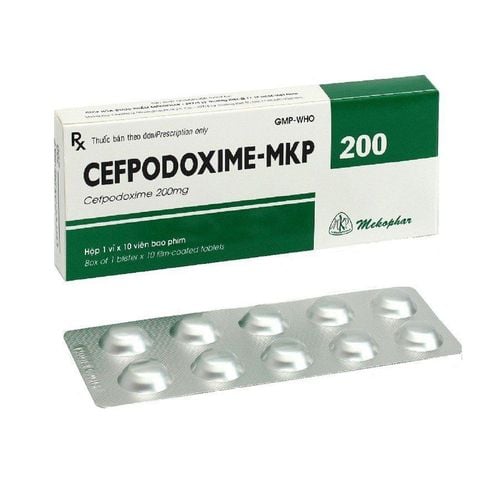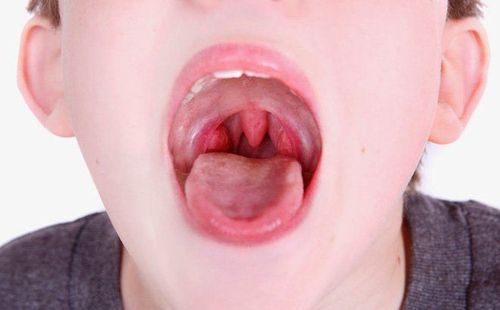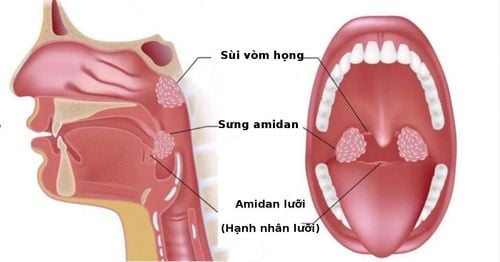This is an automatically translated article.
The article was professionally consulted by MSc Ma Van Tham - Department of Pediatrics - Neonatology, Vinmec Phu Quoc International General Hospital.Tonsillitis is a common disease in the community and if not treated properly, it will progress to chronic and more dangerous tonsillitis such as pneumonia, glomerulonephritis, bacteremia. So, is chronic tonsillitis dangerous? And what are the causes, signs and treatment of chronic tonsillitis?
1. Overview
The tonsils are a lymphatic organ at the back of the throat, the junction between the airways and the airways. It is considered an important gateway to protect the respiratory tract.The main and also the most important function of the tonsils is to prevent the attack of microorganisms (viruses, bacteria, fungi) to the body.
In addition, tonsils also have the function of secreting natural antibodies against infections. For the respiratory tract, the tonsils, are considered as the original "guardian and protector" of the respiratory tract.
Chronic tonsillitis (excessive tonsillitis) is a phenomenon of frequent inflammation, repeated inflammation of the palatine tonsils.
All ages can get tonsillitis, tonsillitis is more common in children and adolescents.

2. Causes of tonsillitis
The main causes leading to tonsillitis such as:
Viruses enter the respiratory tract. Due to the reduced resistance of the body, pathogenic microorganisms available in the nose and throat grow and cause disease. Patients who have been suffering from other respiratory infections such as flu, measles, whooping cough,... Due to cold infection (drinking cold water, eating ice cream, drinking cold beer (adults). Due to the structure of tonsils with many slots and cavities, pathogenic microorganisms can easily hide and detect. Due to poor hygiene of the throat, mouth and teeth. sudden changes in weather (sudden cold when it rains, high humidity,...).
3. Identification signs
Symptoms of chronic tonsillitis are quite few. Sometimes there are no symptoms other than recurrent or relapsing episodes of inflammation that mimic acute tonsillitis.
In addition to some signs similar to acute tonsillitis (only mild fever or no fever, no chills, no chills but occasional fever), chronic tonsillitis also has the following additional symptoms:
Thin body weak, pale skin, cold to the touch, feverish in the afternoon. There is often a sensation of swallowing in the throat. Cough: Mainly dry cough intermittently, lasting in the morning when you first wake up. Sore throat, voice changes. Bad breath: This is a typical symptom of tonsillitis. People with chronic tonsillitis, despite having clean oral hygiene every day, still have bad breath that makes contact people uncomfortable. Occasional coughing and hoarseness, children wheezing, loud snoring. Note: Chronic tonsillitis needs to be distinguished from other diseases such as tuberculosis of the tonsils, stage 2 syphilis, and cancer of the tonsils.
4. How to treat
For chronic tonsillitis, tonsillectomy is now very common. However, strict indications are required.
Indications for surgery
Surgery should be performed only in the following cases:
Chronic tonsillitis 5 to 6 times a year. When tonsillitis has caused complications such as rhinitis, sinusitis, endocarditis, glomerulonephritis, arthritis, etc. And when tonsillitis becomes too much, it causes difficulty breathing, swallowing, and speaking. Surgical method
The most commonly used surgical method in the past is local anesthesia with the following methods: Sluder and Anse. However, today with many advances in technology, the main method is surgery under endotracheal anesthesia by Anse methods or directly with unipolar or bipolar electric knife, laser cutting, Coblator, knife. supersonic,...
5. Principles of disease prevention
Need to clean the nose, throat, mouth well every day. Limit drinking cold water, ice cream, ice. If you have respiratory diseases (pharyngitis, laryngitis, bronchitis, lung,...) need definitive treatment. If there is no indication from the doctor, or can still be overcome, you should not cut the tonsils. In addition, patients should also follow a reasonable diet and lifestyle to avoid possible complications.
Please dial HOTLINE for more information or register for an appointment HERE. Download MyVinmec app to make appointments faster and to manage your bookings easily.
Reference source: Professional documents of the Ministry of Health













